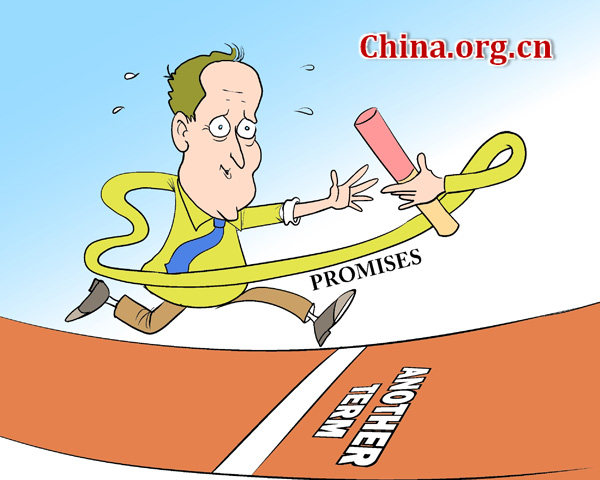British election: business as usual, predictably
- By Tim Collard
 0 Comment(s)
0 Comment(s) Print
Print E-mail China.org.cn, May 11, 2015
E-mail China.org.cn, May 11, 2015
|
[By Jiao Haiyang/China.org.cn] |
The outside world does not expect too much of a British general election these days. Not only do we no longer cut the figure in the world that we once did, but it is also true that foreign policy is not really a great bone of contention in British politics, as it arguably was in the latter days of the Cold War.
The Western interventions in the Middle East this century have certainly been hotly discussed in the public sphere, but in fact, both the major political parties – Labour and Conservative – have been involved in interventions. Only the smaller parties and small groups of dissenters within the major ones have challenged government policy.
Likewise, Britain's relations with Europe are a controversial topic, but again, recent Labour and Conservative governments have both been happy to engage with the European Union from within while maintaining a certain distance from the common currency project.
I cannot imagine that anyone in China was terribly worried about the outcome of this week's British election. No major group in Britain is keen to portray China as a Cold War-model threat to the West or to British interests in the wider world, and there is no appetite in Britain for disrupting smooth relations with China. Both sides of the British political debate see China as an opportunity rather than as a threat. Most see China as a possible source of mutually beneficial synergy whereby China's integration into the global financial system can be smoothed and driven forward. The country is also a potential source of considerable inbound investment.
There have been one or two points of dispute between Britain and China recently, particularly concerning Britain's links to Hong Kong, which occasionally arouse suspicion on the Chinese side, but I cannot imagine that any other British government would be likely to behave differently.
In any case, Prime Minister David Cameron has won a second term, this time with no need for coalitions with other parties. This should be a guarantee for business as usual in both domestic and foreign affairs, but in fact there are two new factors that may well affect Britain's position in the world during the forthcoming five-year parliament.
I mentioned about that Britain's relations with the European Union have been a continuing bone of contention in British politics, although governments have so far always been able to maintain Britain's position within the group.
David Cameron has, however, promised a full-scale binding referendum on Britain's membership within the next two years. He aims first to address widespread popular discontent with the consequences of EU membership by renegotiating some aspects of Britain's obligations to the organization, and then – assuming that a satisfactory renegotiation can be accomplished – to put this to the British people in a referendum.







Go to Forum >>0 Comment(s)